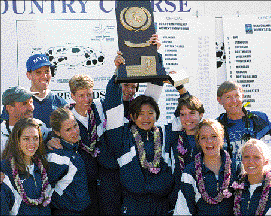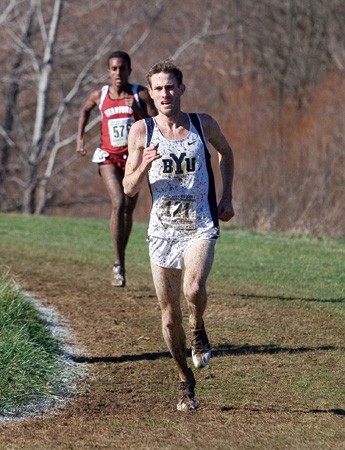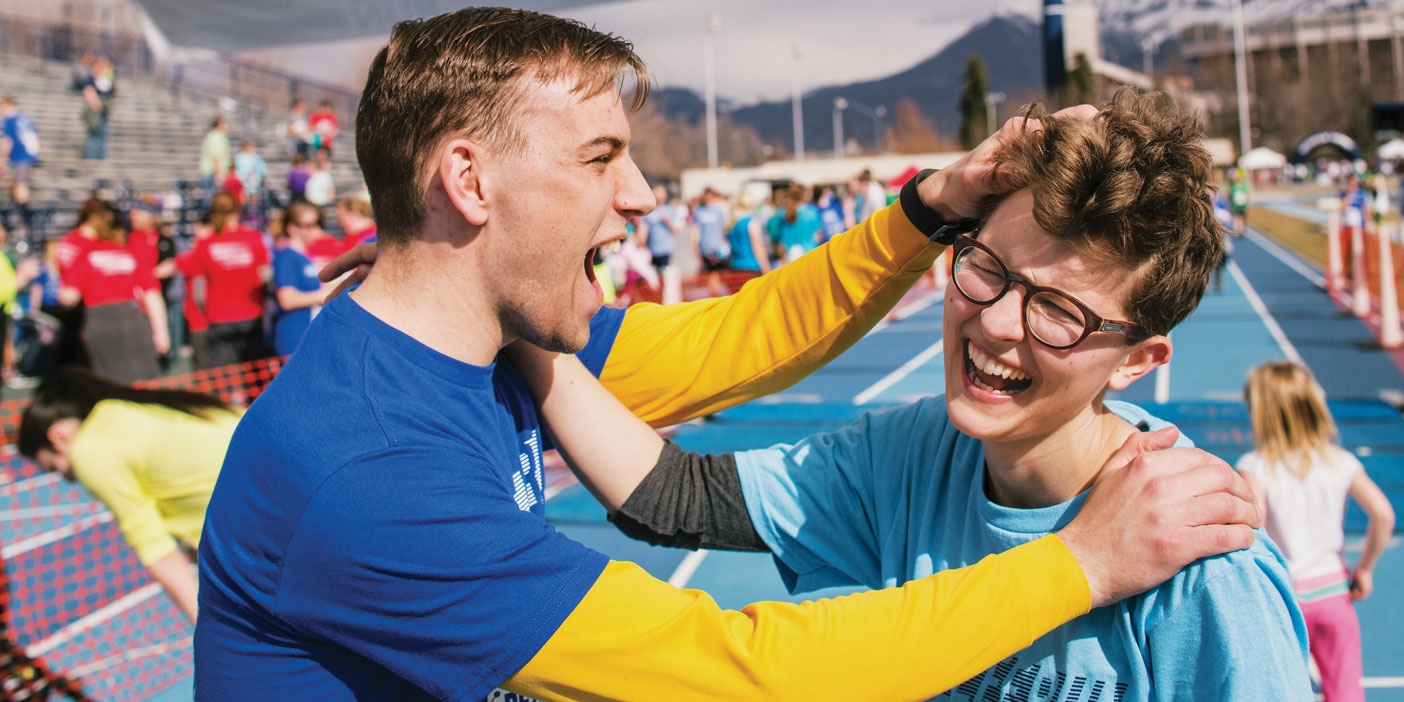
BYU’s newest national champions. Team members who attended the meet (from left): Elizabeth Jackson, Caisa Monahan, Julie Orton, Sharolyn Shields, Maggie Chan, Emily Nay, Courtney Pugmire, Tara Haynes.
By Michael W. Middleton
They weren’t supposed to win. The experts had picked the defending champions, Stanford, to easily win another NCAA title. The media, the coaches poll, and the publications all agreed that Stanford was the nation’s best team. The Cardinals hadn’t lost a meet in over a year.
Defying the odds, the BYU women’s cross country team beat Stanford, 100 to 102, bringing home the first NCAA Championship ever won by a BYU women’s team.
How the Cougars won is as impressive as the title itself.
The national championship race was Monday, Nov. 24, in Greenville, S.C. On Sunday, most of BYU’s opponents followed their typical day-before-the-race routine: stretching, taking warm-up runs, and scouting the race course.
The Cougars attended church, put on a fireside for the youth of the Greenville Stake, and held a meeting to share their feelings about belonging to the team. Near the meeting’s end, assistant coach Gary Preston read Isaiah 40:31: “But they that wait upon the Lord shall renew their strength; they shall mount up with wings as eagles; they shall run, and not be weary; and they shall walk, and not faint.”
The next morning, the waiting was over.
When more than 175 of the nation’s finest cross country athletes stepped to the starting line, seven of them were wearing BYU blue. The starter’s pistol fired, leaving the 5-kilometer course at South Carolina’s Furman University to determine America’s best team.
All-American junior Courtney Pugmire finished first for the Cougars (16:58). She passed two competitors in the last 150 meters to place fifth in the team competition (eighth overall) and claim her fourth All-American honor.
After crossing the finish line, Pugmire’s focus changed from running her best to finding her teammates. “As soon as I finished, I started watching for the other girls,” she said. “But all I saw was Stanford, and I was sick to my stomach.”

Poised for the starting gun, the Cougars (in blue) stand together at the beginning of the course. Within the half hour they gathered once again – this time as national champions.
What Pugmire couldn’t see was that her teammates were coming in championship form.
Maggie Chan, a junior who holds records in her native Hong Kong for five different events, shadowed twoof Stanford’s top runners until the course’s last hill, where she passed them both on her way to a 13th-place finish and her third All-American award.
“About 150 yards from the finish, we had a big Y flag tied in the trees,” said sophomore Elizabeth Jackson. “Coach yelled to me from the sidelines that we had a chance to win, and I thought to myself, ‘Okay, make it to the Y, and then kick.'”
Jackson finished 22nd to win her second All-American citation, and freshman Tara Haynes was 27th, just missing All-American status. But with four runners in for both schools, BYU trailed Stanford in the team totals. With the fifth runner, however, there was still a chance.
In cross country, seven runners compete for each team, with the finish of the top five runners counting toward the team score. The places taken by the five scored runners are added together and the team with the lowest combined score wins.
“I was counting places as the girls came by me,” head coach Patrick Shane recalled. “And I was telling the girls that if they all held their places, we’d win the national championship.”
Then it happened.
In the last 100 meters of the race, BYU’s fifth runner, Caisa Monahan, a sophomore, was inadvertently tripped by another runner.
With the team title on the line, the Cougars’ Emily Nay, a junior, came through; she sprinted past Monahan to place 33rd and cement BYU’s team score at 100 (fifth, 13th, 22nd, 27th, and 33rd).
Now it was only a matter of where Stanford’s fifth runner finished.
Courageously Monahan, who had read the story of The Little Engine Who Could to the team the night before the race, got up and finished. Despite her fall, she still beat the Cardinal’s fifth runner, knocking Stanford’s score back a point and ensuring the Cougars’ 100 to 102 victory. Colorado finished a distant third at 178.
BYU had won, at least unofficially.
While NCAA officials reviewed the race and re-tabulated the results, the Cougars gathered for a team prayer. “We got in a little circle and prayed that whatever the outcome was we would feel good about it,” Jackson said.
Then they waited.
“I thought it was kind of funny,” said Haynes. “They posted the results but they put a paper above them that said ‘unofficial.’ Finally one of the race judges came out and clipped the ‘un’ off with a pair of scissors, and we knew we had it.”
There was a lot of hugging, a little crying, and a number of reporters sheepishly asking the newly crowned champions for interviews.
“It was an incredible experience–like a fairy tale,” Nay said. “It was so close, and you could see little things in the race where if this or that hadn’t happened we wouldn’t have won.”
“I told the girls before the race that the best team would win,” Shane told the media. “That’s what I think happened today.”
Four months earlier Coach Shane had promised the team that if they won the national championship they could shave off his mustache. Despite all the excitement, they hadn’t forgotten.
Local and national media crowded around while each athlete and Shane’s wife, Monica, took a turn with Chan’s electric razor or the medical scissors supplied by the team’s athletic trainer, Larry Morgan.
Coach Shane was clean shaven (and, remarkably, not bleeding) when the announcement came that he had been selected as National Cross Country Coach of the Year.
“Winning a national championship is something you dream and dream about,” Shane said. “Now that it’s happened it still feels like a dream.”
But it was a dream with a price.
“After winning the district meet, we all got together and signed an agreement about what we would do to prepare for nationals,” said senior Julie Orton. “We made bracelets that we all wore to remind us of our commitment.”
The bracelets, made of connected fishing swivels, were proudly worn next to the NCAA Championship watches the team received at the awards ceremony.
Still, even while they were holding the national championship trophy, the 1997 Cougars were more easily measured by heartbeats than stopwatches. “The closeness of this team is what distinguishes us from other teams,” said freshman Sharolyn Shields. “We all care about each other so much, and we worry how each person does.”
Monahan said, “We had a major advantage over all the other teams because we had a fireside, we had a team testimony meeting, and we are so much closer as a team. Those are my favorite parts of the weekend, maybe even more than the race.”
As a team tradition before each meet, each athlete writes an inspirational thought on the tarp the team uses to store its equipment. The morning of the race, Orton added these telling words, paraphrasing Vince Lombardi: “We will win because we love each other, and because we love each other we will do for one another what we couldn’t do for ourselves.”
Describing her teammates, Pugmire said, “They’re like my sisters; we are that close.”
With all seven of the athletes who competed for the Cougars returning next year, one NCAA title may be only the beginning of what BYU’s newest national champions will do.
Michael W. Middleton, a BYU alum, works with the BYU Cougar Club









